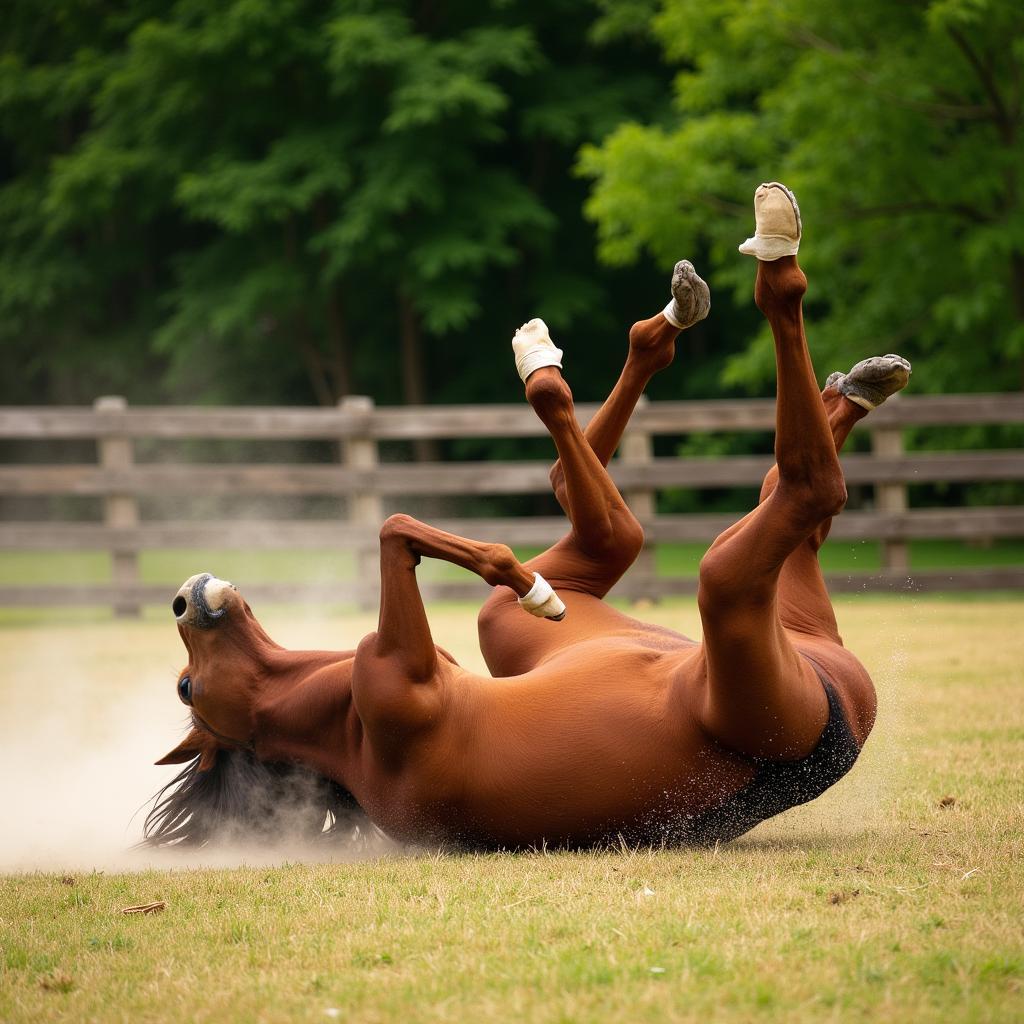When you encounter the phrase “Horse On The Floor,” it likely sparks curiosity. This phrase can encompass various scenarios, from a playful horse rolling on the ground to a more serious situation requiring veterinary attention. Understanding the reasons behind this behavior is crucial for any horse owner or enthusiast.
 Horse happily rolling on the floor
Horse happily rolling on the floor
Why Does a Horse Lie Down or Roll on the Floor?
Horses exhibit a range of behaviors, and lying down or rolling on the floor is a natural part of their repertoire. These actions can serve several purposes:
- Comfort and Itch Relief: Just like dogs, horses enjoy a good scratch. Rolling allows them to reach itchy spots they can’t groom themselves. This is particularly common after a sweaty workout or during shedding season. Proper horse trailer flooring and best flooring for horse stalls can contribute to their comfort and cleanliness, minimizing the need for excessive rolling due to skin irritation.
- Playfulness and Relaxation: A horse rolling on the floor can be a sign of pure enjoyment. They might be feeling playful, energetic, or simply content. Observing this behavior can be quite entertaining.
- Shedding and Coat Care: Rolling helps horses shed loose hair and distribute natural oils throughout their coat. This keeps their skin healthy and their coat shiny.
When is a “Horse on the Floor” Cause for Concern?
While rolling is typically normal, there are instances when a horse on the floor signals a problem:
- Colic: A horse rolling excessively, especially accompanied by other symptoms like sweating, pawing, or looking at their flanks, could be experiencing colic. This is a serious digestive issue requiring immediate veterinary attention.
- Injury or Illness: If a horse struggles to get up after lying down, or exhibits signs of pain or discomfort, they might be injured or ill.
- Neurological Issues: Certain neurological conditions can cause horses to lose coordination and fall.
How to Differentiate Normal Rolling from a Problem?
Observing your horse’s overall behavior is key. If they seem otherwise healthy, alert, and are eating and drinking normally, the rolling is likely benign. However, any sudden changes in behavior warrant attention. For horse enthusiasts, understanding horse riding pelvic floor is important for their own well-being, while horse tiles offer a practical solution for stable flooring.
Conclusion
Seeing a horse on the floor can be alarming or amusing, depending on the context. Understanding the reasons behind this behavior allows us to differentiate between normal horse behavior and potential health issues. Regular observation, knowledge of your horse’s typical habits, and prompt veterinary care when needed are essential for responsible horse ownership. By paying attention to the subtleties of your horse’s behavior, you can ensure their well-being and enjoy their playful antics. Remember, sometimes a horse on the floor is just enjoying a good roll! If you are considering new flooring options, check out our guide on the best flooring for horse stalls. We also offer resources on horse hair broom for hardwood floors, a perfect tool for keeping your stable clean. You can learn more about horse trailer flooring options as well.
FAQ
- How often do horses typically roll?
- Is it normal for a horse to sleep lying down?
- What are the signs of colic in horses?
- How can I make my horse’s stall more comfortable?
- What should I do if my horse is down and can’t get up?
- Can rolling be a sign of stress in horses?
- What types of flooring are safe for horse stalls?
Suggested Further Reading
- Horse Riding Pelvic Floor
- Horse Trailer Flooring
For further assistance, please contact us at Phone Number: 0772127271, Email: [email protected] or visit our address: QGM2+WX2, Vị Trung, Vị Thuỷ, Hậu Giang, Việt Nam. We have a 24/7 customer support team.